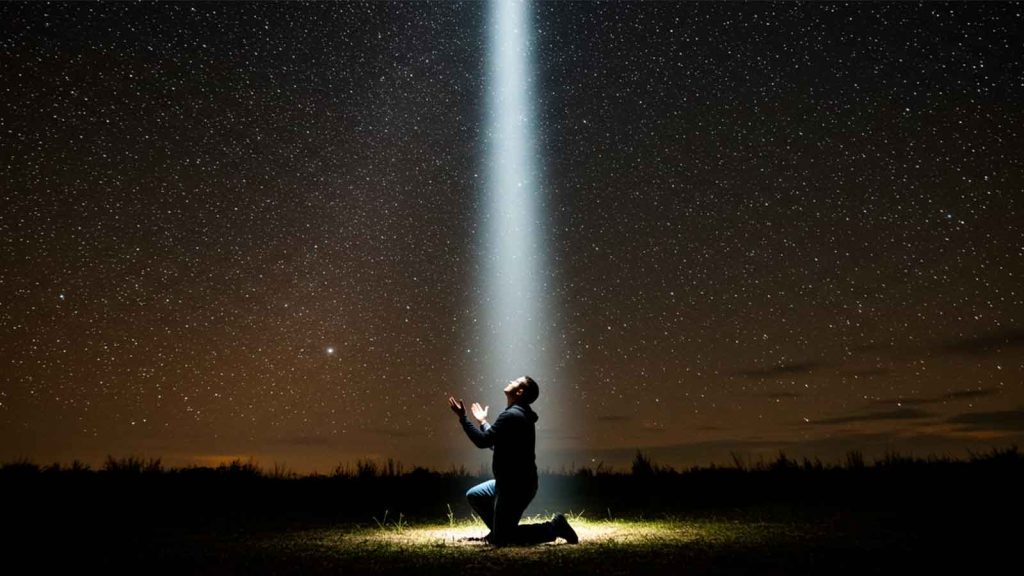Psalm 121 opens a powerful song of confidence amid life’s challenges. Placed among the “Songs of Ascents,” it speaks directly to those who need support, showing that true help comes from God, the Creator of all.
Psalm 121 Complete
¹ I will lift up my eyes to the mountains—where does my help come from?
² My help comes from the Lord, the Maker of heaven and earth.
³ He will not let your foot slip; He who watches over you will not slumber.
⁴ Indeed, He who watches over Israel will neither slumber nor sleep.
⁵ The Lord watches over you; the Lord is your shade at your right hand.
⁶ The sun will not harm you by day, nor the moon by night.
⁷ The Lord will keep you from all evil; He will guard your life.
⁸ The Lord will watch over your coming and going, both now and forevermore.
Psalm 121 Explained
Psalm 121:1
I will lift up my eyes to the mountains—where does my help come from?
The psalmist begins with a symbolic gesture: raising one’s eyes to the hills. This action represents search, expectation, and even anguish. Mountains could be associated with places of worship or danger. The implicit question shows the psalmist is seeking help amid an adverse setting.
Psalm 121:2
My help comes from the Lord, the Maker of heaven and earth.
The answer comes with clarity and conviction. Help does not come from the hills but from the Creator of all things. God, as the author of heaven and earth, has total sovereignty over the universe and is therefore completely trustworthy to help in any situation.
Psalm 121:3
He will not let your foot slip; He who watches over you will not slumber.
Here we find a strong sense of personal protection. The “foot” represents life’s walk and daily steps. God, the faithful guardian, does not allow the righteous to stumble. “Slumber” expresses drowsiness; the psalmist affirms that God never loses control, even in the hardest moments.
Psalm 121:4
Indeed, He who watches over Israel will neither slumber nor sleep.
This verse reinforces the previous one and broadens its scope from the individual to the whole nation. God is attentive not only to the individual believer but also to the entire nation of Israel. He does not doze and never abandons His role as protector.
Psalm 121:5
The Lord watches over you; the Lord is your shade at your right hand.
This image conveys intimate proximity. Being shade at someone’s right hand means being constantly at their side as personal protection. Just as a shadow follows the body in every movement, so God follows His people at all times.
Psalm 121:6
The sun will not harm you by day, nor the moon by night.
The psalmist uses poetic language to declare that no threat—physical, emotional, or spiritual—can reach the faithful. Sun and moon symbolize the extremes of time and circumstance, and God’s protection covers both.
Psalm 121:7
The Lord will keep you from all evil; He will guard your life.
The Lord’s care is complete and holistic. He protects against every kind of evil and extends His guard to the very core of human existence—the soul. God guards not only the body but also the emotions, mind, faith, and spirit of His people.
Psalm 121:8
The Lord will watch over your coming and going, both now and forevermore.
The psalm ends with a promise that spans time and space. “Coming” and “going” symbolize the beginning and end of any activity or phase in life. The phrase “both now and forevermore” confirms that divine care is continuous, limitless, and uninterrupted.

Historical Context of Psalm 121
Psalm 121 belongs to the collection of Songs of Ascents, also known as Songs of Degrees, which encompass Psalms 120 to 134. These psalms were sung by worshippers on pilgrimage to Jerusalem—a journey engaging both body and soul.
A Psalm for Those Who Ascend
During the great Jewish festivals—Passover, Pentecost, and Tabernacles—the people physically ascended to Jerusalem, which lies in a mountainous region. Thus, expressions like “lift up my eyes to the mountains” have a literal, geographic basis. Yet the ascent also symbolizes a spiritual elevation toward God’s presence.
Dangers of the Journey
The roads of that time were full of challenges: bandits, wild animals, scorching sun, cold nights, and unstable terrain. The path required endurance and courage. Psalm 121 therefore emerges as a song of supplication and trust, spoken by those walking amid risks and seeking security beyond what is visible.
Rejecting False Help
Mountains were also places where neighboring peoples built altars to pagan deities. By saying that help “comes from the Lord, the Maker of heaven and earth,” the psalmist is not merely looking upward but making a spiritual choice: to trust in God rather than in human solutions or idolatry.
Ongoing Spiritual Application
Even outside the original context of physical pilgrimage, Psalm 121 remains relevant. It represents everyone on a journey—emotional, family, professional, or spiritual—who needs protection, guidance, and the Lord’s constant presence. Its content is an eternal answer to all who ask, “Where does my help come from?”
Poetic Structure of Psalm 121
This psalm is short, with only eight verses, yet rich in literary beauty. Its parallelism reinforces the central message: God is vigilant, constant, and utterly trustworthy.
Central Themes of Psalm 121
Complete Trust
Psalm 121 states that true help does not come from human resources but from the Lord. The trust here is total and without reservation.
Continuous Protection
God’s watchfulness never fails. He is the guardian who does not sleep, present in every exit and entrance of life.
Holistic Care
The protection is not only physical but also emotional, spiritual, and permanent—a care that encompasses the whole person.

Practical Applications of Psalm 121
For Those Facing Uncertainty
In times of crisis or fear, reciting Psalm 121 can bring peace by reminding us who the true helper is.
For Travelers
Many use this psalm as a prayer before a journey. It reinforces that God guards every road.
In Moments of Transition
Job changes, life stages, or important decisions are good occasions to meditate on Psalm 121.
Psalm 121 in Liturgy and Tradition
In both Jewish and Christian traditions, this psalm is used in worship services, ceremonies, and moments of farewell. The certainty that God guards every step has accompanied God’s people for centuries.
Biblical Connections with Psalm 121
The message of Psalm 121 resonates across many Bible passages, both Old and New Testaments. Below are a few connections that reinforce its central themes of divine vigilance, continuous protection, and complete trust.
Isaiah 40:28 — The God Who Never Tires
“Do you not know? Have you not heard? The Lord is the everlasting God, the Creator of the ends of the earth. He will not grow tired or weary, and His understanding no one can fathom.”
This directly reinforces Psalm 121:4, which says the “guardian of Israel” neither sleeps nor slumbers. Both texts reveal an untiring God whose attention never fails.
Jude 1:24 — Able to Keep You from Falling
“Now to Him who is able to keep you from stumbling and to present you before His glorious presence without fault and with great joy…”
In the New Testament, this declaration echoes Psalm 121:3, which says God “will not let your foot slip.” Divine care is not limited to the physical; He guards the believer’s spiritual walk as well.
Psalm 46 — A Very Present Help
“God is our refuge and strength, a very present help in trouble.”
As in Psalm 121, the term “help” is emphasized. Both psalms assure that God is not a distant observer but an active, present, and effective aid in life’s hardest moments.
Proverbs 3:5–6 — Trust in All Your Ways
“Trust in the Lord with all your heart and lean not on your own understanding; in all your ways submit to Him, and He will make your paths straight.”
This passage dialogues with Psalm 121:8, where God promises to guard both entry and exit. Trusting Him in every path acknowledges His constant protection—from the simplest choices to life’s greatest decisions.
Matthew 28:20 — Presence to the End
“And surely I am with you always, to the very end of the age.”
Jesus’ words echo the closing of Psalm 121: “both now and forevermore.” The promise of continuous divine presence connects the Old and New Testaments, reaffirming God’s faithfulness throughout time.

Frequently Asked Questions (FAQ)
What does “shade at your right hand” mean?
It is a metaphor for constant presence. Just as a shadow accompanies every movement, God is beside the believer.
Does Psalm 121 guarantee we will not face difficulties?
No. It promises presence and protection amid difficulties, not their absence.
Can I use Psalm 121 as a prayer?
Yes. It is often used as a prayer, especially in times of distress, before travel, or at farewell ceremonies.
What is the main teaching of Psalm 121?
Confidence in the God who continually guards, in both the small and large journeys of life.
Conclusion
Psalm 121 is an invitation to unconditional trust. It not only offers comfort but also repositions our faith in the God who never sleeps, never fails, and is always present. In every ascent, challenge, or bend in the road, the promise remains: the Lord will watch over your coming and going, both now and forevermore.
READ ALSO:
- Psalm 87: A Song of Glory to Zion
- Psalm 88: A Deep Cry Amid Affliction
- Psalm 89: A Song of Covenant and Hope
FOLLOW US ON FACEBOOK